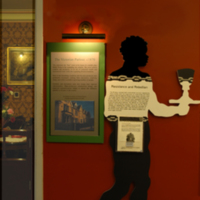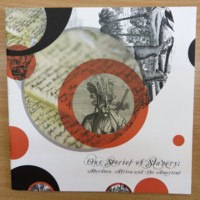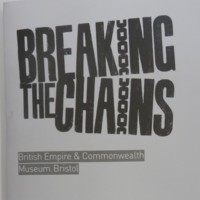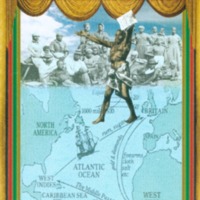
Unfair Trade
York Castle Museum's Unfair Trade exhibition used the museum's collections to explore slavery from the viewpoint of ordinary people, and how consumption of slave-produced everyday commodities - sugar, tea, coffee, cocoa - contributed to the slave trade. It also looked at the part played by York in the abolition of the slave trade and slavery, with the many Quakers of the city supporting William Wilberforce and helping to finance his election campaign. The exhibition continued the focus on consumption into modern life by asking visitors to consider where the products they buy come from. York Castle Museum features a recreated Victorian street, Kirkgate, with its own newspaper, 'The Kirkgate Examiner'. A special edition was distributed to coincide with the exhibition.

Our Stories of Slavery: Aberdeen, Africa and the Americas
The Our Stories of Slavery events programme ran from May to October 2007, co-ordinated by the Arts Development team at Aberdeen City Council. The project examined all aspects of Aberdeen's links with slavery and the transatlantic slave trade, including the role of Aberdonian landowners as slave owners, as well as the impact of Aberdonians as abolitionists, such as the roles played by James Beattie and James Ramsay.
One focus of the project was on the role of Aberdonian magistrates in kidnapping children from the City and Shire and selling them into indentured service to plantation owners during the 18th century. Peter Williamson, known as 'Indian Peter', was one of up to 700 kidnapped in Aberdeen between 1735 and 1750. The project used his story, with archives at the University of Aberdeen, in a range of activities including storytelling, re-enactments, film making, workshops, creative writing and craft workshops. Kidnapped was a re-enactment set in and around The Tolbooth (Aberdeen's Museum of Civic History). In collaboration with artist Chris Biddlecombe, community knitting circles created 'Cast-offs', exhibited at Aberdeen's Kirk of St Nicholas, whereby an installation of 600 knitted jumpers represented the abducted children.

Breaking the Chains
Breaking the Chains opened at the British Empire and Commonwealth Museum to coincide with the bicentenary, and told the story of the British transatlantic slave trade and its abolition. Developed in partnership with Bristol City Council's Museums, Galleries and Archives' Service, the exhibition used artefacts, film and testimony to challenge perceptions about Britain's involvement in the slave trade and its legacy today. It featured a multimedia gallery of digital memories and feelings on the contemporary legacies of the slave trade; interactive sound stations to see and hear personal testimonies and the power of black music; and the ‘Me deya’ gallery, led by Firstborn Creatives, a collection of work from artists and communities who wished to share their creative pieces about the legacies of the slave trade. Associated events included African music for children, community dance events and public debates.

Leeds Bicentenary Transformation Project
This collaborative community initiative celebrated African and Caribbean culture in Leeds, with a focus on commemorating the Abolition Act by 'highlighting African achievement, liberation and aspirations'. New exhibitions, publications and resources were produced and over 100 bicentenary events organised under different themes: Education and Museums; Arts and Carnival Culture; Churches and Abolition; Legacy; Black History and Community Development; Media and Communications. Highlights included the photographic exhibition and pamphlet 'From Abolition to Commonwealth', which remembered indentured labour in Africa and the Caribbean after 1807, and the 40th anniversary of Leeds West Indian Carnival, with themes that highlighted heritage, liberation, respect and freedom. Project outputs included an education pack, black history classes, concerts, church services, lectures and performances.